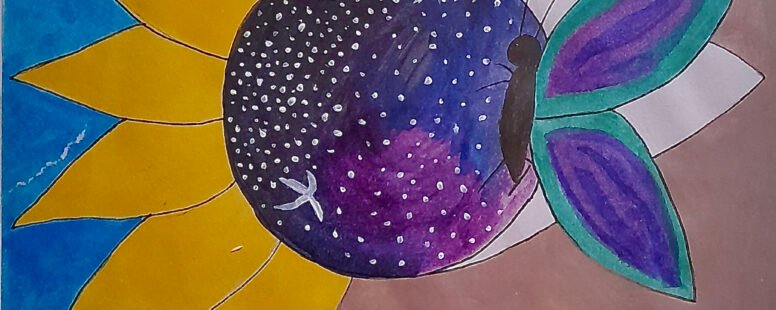/ February 7, 2024/ Blog, Personal Stories
I was 17 when I escaped a Cult. Okay, I didn’t escape per se… But I did break free from a Religion that initially felt like the New Age Spirituality positive-vibes crowd. Later, I also escaped those… One important thing for context: I grew up in a household with no space for feelings and a narcissistic and co-dependant dynamic. You can listen more about this on here.
Navigating Beliefs: A Teen's Tale of Opus Dei, Bullying, and Spiritual Exploration
Let me start from the beginning. I had just changed schools because I had been bullied as the “nerd” that I (now, proudly) am. Before the school year started, I went to a summer camp with a group of people that were associated with the new school and with the Opus Dei. Like any other summer camp, I expected adventure-sport-nature-exploring kind of thing. That did happen 3 times per week, but it was a *Christian* summer camp.
We went to Mass every day, we prayed the Rosary every day, and we had daily workshops with team leaders about Jesus… We also had a daily sermon with a priest, that I actually didn’t mind. As an introverted and nerdy person, I had a vast internal world so self development is something I had always been interested in and have actively been doing. However, I had never had a safe space with anyone to discuss or share it. Even though the religious stuff was a bit much (and now looking back, definitely cult-like), I had did learn a few lessons I could apply to my life, I had fun and the girls in the summer camp made me feel like I belonged there.
In the new school I was, once again, bullied. This time it was for different reason but the result was a deeply insecure and teenage girl in need of a group to belong to. I was 15 at this point and had very few friends, so I got overly involved in the Opus Dei group. After class, I would go to this centre where I studied and joined in activities with some kind of Christian message. I opened myself up to them and I thought they were real friends that knew me for me.
I started to spend less and less time with my family and other friends because they “just didn’t get it”. They would talk about people who had left the Opus Dei with an attitude of superiority and disdain. In order to feel like I belonged, I sort of agreed with them, but I secretly feared being one of the “bad people who (eventually) turned to the dark path”. I was also introduced to “guilt” to a level that I struggled for years to shake off when they used sentences like “Jesus would be so sad if you didn’t go to Church on Sundays. He died on the cross for your sins and you can’t even go to Church?”.
After 2 years of that, I was encouraged to think, but I also felt deep down that God had chosen me to give my life to him. That meant to become a member of the Opus Dei. I went back and forth with my parents, who, thank God (figuratively and literally), asked me to go to university first. I didn’t agree with them at first, but I started asking questions to the people in the Opus Dei. They would not answer or would give me answers that made no sense at all.
I was 17 then, about to take my exams prior to getting into university and trying my best to be a good person while following my own path. After a couple of weeks with an awkward vibe, they all turned their back to me. I felt abandoned by those I thought were my friends and my support system.

Followers or Fanatics: Decoding Cultish Trends in the Digital Age of Spirituality
A few years after this, I had healed some of the wounds the Opus Dei created in relation to God and I opened up to Spirituality again. I am someone who is interested in learning, so after 2020, I started following a variety of people who write or share things that would make me think, especially those who seemed like regular people trying to better themselves and interested in critical thinking.
Because of my experience with the Opus Dei, I “worked” alone in Spirituality. This means that I was very aware and apprehensive about joining any group because it felt too much like religion. Personally, having studied more about other cultures, religion seems now a bit too constricting. However, in the age of social media, people can portray to be whoever they want. There are so many spiritual influencers that are creative, talented and good at painting a seemingly insightful aesthetic of Spiritual wisdom that I often forgot to use my discernment. I ended up accepting knowledge that was not true for me and joined in way too many lives and spent more time that I had listening to these people.
While I acknowledge that not all are cults, some exhibit troubling cult-like behaviours. As I continued to heal on my own, I noticed some patterns that reminded me of the Opus Dei. The leaders often presented themselves as people with exclusive access to higher truths. Their messages, while initially inspiring, sometimes took a turn toward guilt and manipulation. There was a subtle pressure to conform to their teachings, buy their products, and join exclusive membership programs promising unparalleled spiritual growth. What truly made me wake up from the trance was to witness the treatment of those who dared to question these digital gurus. The tactics they used to silence dissenters mirrored the manipulative strategies I had once experienced.
With everyone questioning things and looking for spiritual wisdom in 2020, these digital communities exploded. However, this fast change often means changing or giving up old relationships. So now, we’re in this new reality where things make more sense, but it can also feel lonely. Followers of these spiritual gurus, are drawn by the allure of spiritual growth, and are often entangled in a web of obligations and conformity.
After getting caught up in the spiritual realm for longer than intended, and with gratitude for the increase in my discernment, I am now extremely careful with who I am following and do not engage more than what I deem necessary.

Cult Chronicles: Navigating the Fine Line Between Religion, Spirituality and Exploitation
These are a few characteristics that are commonly identified through research on psychology, sociology, and cult studies.
- Authoritarian Leadership: Cults typically revolve around an authoritarian leader who have unquestioned power. Members are indoctrinated to follow the leader’s orders without hesitation or critical thinking. This authority figure is often charismatic, manipulating followers into believing that absolute obedience is essential for spiritual enlightenment or personal salvation.
- Isolation: One of the most significant traits of cults is isolation of members from external influences. This serves to control the information that is reaching followers, limiting exposure to other perspectives that could challenge the cult’s ideology. Isolation extends beyond physical seclusion; cults may encourage emotional detachment from family and friends who are perceived as a threat to the group’s influence. By cutting these connections off, cults strengthen their hold on individuals, making them more susceptible to manipulation.
- Us vs. Them Mentality: Cults foster an “us vs. them” mentality, creating a dichotomy between the group and the outside world. This is reinforced through a narrative that portrays the external environment as hostile, corrupt, or spiritually devoid. By positioning the cult as the exclusive source of safety, salvation, or enlightenment, members become psychologically bound to the group, viewing any dissent or departure as a dangerous rejection of the only safe place.
- Manipulation and Mind Control: Cults use sophisticated techniques of psychological manipulation and mind control to dominate their members’ thoughts and actions. Love-bombing, an overwhelming display of affection, is used to create emotional dependency, while sleep deprivation weakens cognitive resistance. Mind-altering substances may be introduced to induce altered states that leads to suggestion. These tactics take away any individual autonomy, creating an environment where members are psychologically dependent on the cult and its leader for a sense of purpose and reality.
- Exploitation of Vulnerability: Cults often target individuals in vulnerable situations, exploiting their emotional, psychological, or existential vulnerabilities. During challenging life phases, such as personal crises or transitional periods, individuals may be more susceptible to the allure of belonging, purpose, or answers that cults claim to give. Cults capitalise on these vulnerabilities, offering a what it seems to be a transformative solution while entangling individuals in their web of influence.
- Financial Exploitation: Cults often demand substantial financial contributions from their members, perpetuating a cycle of financial exploitation. Members may be coerced or guilt-tripped into donating significant amounts for the group’s greater cause. This financial control not only creates wealth for the cult but also ensures that members remain financially invested, making it more challenging for them to break away.
- Suppression of Dissent: Cults strictly suppress any form of questioning, so that alternative perspectives are unwelcome and perceived as threats. Members are discouraged from expressing doubts or criticisms, and those who do face punitive measures. This suppression helps maintain a homogeneous ideology within the group, preventing internal challenges to the leader’s authority or the group’s core tenets.
These tactics collectively form a web of control that makes individuals in a cult’s grasp, manipulating their thoughts, emotions, and behaviours to serve the interests of the charismatic leader and the group. Understanding these patterns is crucial for recognising and resisting the influence of destructive cults.
Beyond the Illusions: Understanding Religion, Cults, and New Age Spirituality

The journey from the oppressive Opus Dei to the free fall of digital spirituality has made me a huge advocate of critical thinking and independence. Recognising the markers of exploitation and manipulation, I now follow my own path when it comes to Spirituality, embracing genuine connections while staying away from any entanglements.
I hope that this blog exploring the fine lines between Religion, Cults, and New Age Spirituality serves as a guidepost for those travelling through similar scenery. I also hope to have been able to switch on a light so that you can see beyond the illusions and find yourself once more.
